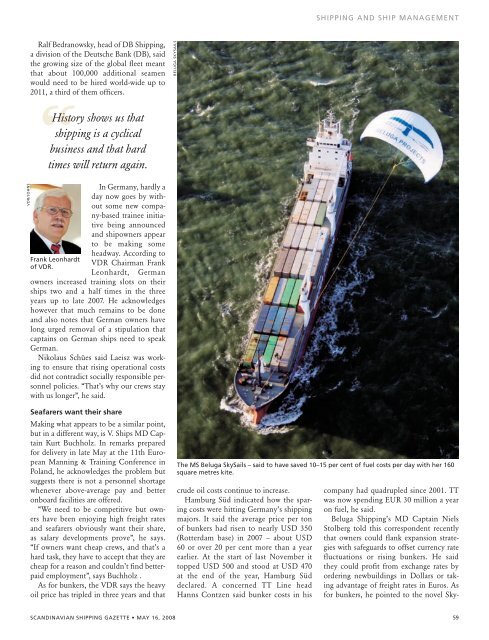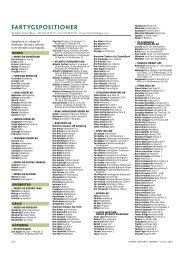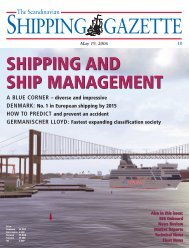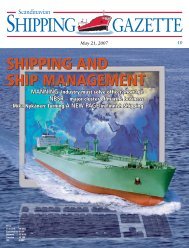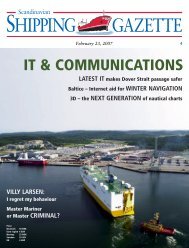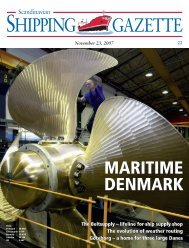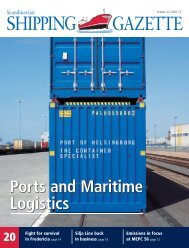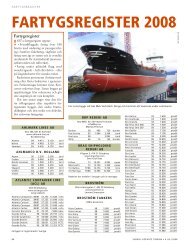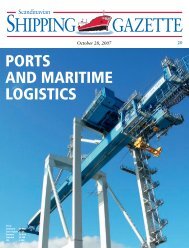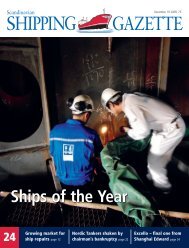SSG No 10 - Shipgaz
SSG No 10 - Shipgaz
SSG No 10 - Shipgaz
- TAGS
- shipgaz
- shipgaz.com
You also want an ePaper? Increase the reach of your titles
YUMPU automatically turns print PDFs into web optimized ePapers that Google loves.
VDR/JoHnS<br />
Ralf Bedranowsky, head of DB Shipping,<br />
a division of the Deutsche Bank (DB), said<br />
the growing size of the global fleet meant<br />
that about <strong>10</strong>0,000 additional seamen<br />
would need to be hired world-wide up to<br />
2011, a third of them officers.<br />
History shows us that<br />
shipping is a cyclical<br />
business and that hard<br />
times will return again.<br />
Frank leonhardt<br />
of VDR.<br />
In Germany, hardly a<br />
day now goes by without<br />
some new company-based<br />
trainee initiative<br />
being announced<br />
and shipowners appear<br />
to be making some<br />
headway. According to<br />
VDR Chairman Frank<br />
Leonhardt, German<br />
owners increased training slots on their<br />
ships two and a half times in the three<br />
years up to late 2007. He acknowledges<br />
however that much remains to be done<br />
and also notes that German owners have<br />
long urged removal of a stipulation that<br />
captains on German ships need to speak<br />
German.<br />
Nikolaus Schües said Laeisz was working<br />
to ensure that rising operational costs<br />
did not contradict socially responsible personnel<br />
policies. “That’s why our crews stay<br />
with us longer”, he said.<br />
Seafarers want their share<br />
Making what appears to be a similar point,<br />
but in a different way, is V. Ships MD Captain<br />
Kurt Buchholz. In remarks prepared<br />
for delivery in late May at the 11th European<br />
Manning & Training Conference in<br />
Poland, he acknowledges the problem but<br />
suggests there is not a personnel shortage<br />
whenever above-average pay and better<br />
onboard facilities are offered.<br />
“We need to be competitive but owners<br />
have been enjoying high freight rates<br />
and seafarers obviously want their share,<br />
as salary developments prove”, he says.<br />
“If owners want cheap crews, and that’s a<br />
hard task, they have to accept that they are<br />
cheap for a reason and couldn’t find betterpaid<br />
employment”, says Buchholz .<br />
As for bunkers, the VDR says the heavy<br />
oil price has tripled in three years and that<br />
bEluGA SkYSAIlS<br />
The MS beluga SkySails – said to have saved <strong>10</strong>–15 per cent of fuel costs per day with her 160<br />
square metres kite.<br />
crude oil costs continue to increase.<br />
Hamburg Süd indicated how the sparing<br />
costs were hitting Germany’s shipping<br />
majors. It said the average price per ton<br />
of bunkers had risen to nearly USD 350<br />
(Rotterdam base) in 2007 – about USD<br />
60 or over 20 per cent more than a year<br />
earlier. At the start of last <strong>No</strong>vember it<br />
topped USD 500 and stood at USD 470<br />
at the end of the year, Hamburg Süd<br />
declared. A concerned TT Line head<br />
Hanns Contzen said bunker costs in his<br />
SHIPPING AND SHIP MANAGEMENT<br />
company had quadrupled since 2001. TT<br />
was now spending EUR 30 million a year<br />
on fuel, he said.<br />
Beluga Shipping’s MD Captain Niels<br />
Stolberg told this correspondent recently<br />
that owners could flank expansion strategies<br />
with safeguards to offset currency rate<br />
fluctuations or rising bunkers. He said<br />
they could profit from exchange rates by<br />
ordering newbuildings in Dollars or taking<br />
advantage of freight rates in Euros. As<br />
for bunkers, he pointed to the novel Sky-<br />
SCANDINAVIAN SHIPPING GAZETTE • MAY 16, 2008 59


